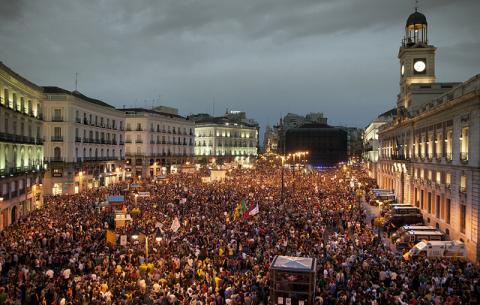Indignados take back Puerta del Sol on movement's anniversary

Thousands of indignados reoccupied Madrid's Puerta del Sol on Saturday as part of a global day of action to mark the anniversary of the movement. By Jérôme Roos.
Why would we need political parties if we can have a political party? That’s the question that rang through my head as I roamed around Puerta del Sol last night, climbing on top of the metro station to see a crowd of hundreds of thousands amassed in the square. In one corner, people were actively debating alternatives to capitalism and representative democracy — in another, hundreds were dancing wildly to the beats of a professional drum circle.
At midnight, the square was still crammed with people. Earlier, tens of thousands had marched to Sol from four different corners in the city. Walking along with the Southern march, we witnessed the incredible sight of more people joining us in every single neighborhood we passed through. In a sign that the 15-M movement has effectively decentralised itself, neighborhood assemblies amassed locally and then joined the larger marches to Sol.
The principle reason the indignados took back to the square last night is that this week marks the first anniversary of the movement. On 15 May last year, several dozen activists followed in the footsteps of the Tahrir revolutionaries and pitched the first tents on Puerta del Sol, marking the birth of a non-violent popular protest movement that would quickly spread throughout Spain, to Greece and then on to Wall Street and beyond.
As part of this anniversary, the assemblies of the 15-M movement called for another global day of action, like the one on 15 October last year. The call was answered by hundreds of thousands of people in 60 Spanish cities and at least 50 countries throughout the world. In Tel Aviv, tens of thousands took to Rabin Square to fire up their own movement again, while Occupy London protesters were met with a police crackdown on their attempt to set up a new camp.
But there was another, less festive reason the indignados were back in the square this weekend. A year down the line, a right-wing government has come to power and the economic situation has only further aggravated. With investors fearing a Greek-style escalation of the country’s debt troubles, Spain has now become the focal point in Europe’s never-ending crisis. In response, the government pushed through the most radical austerity program on the continent.
Furthermore, the government made a move this week to bail out the country’s third biggest lender, Bankia, which had long been beset with trouble as more and more homeowners began to default on their mortgages. Spain is plagued with the highest unemployment in the developed world: almost 25% for the average population and over 50% for the younger generation. Since 2007, over 350,000 families have been evicted from their homes.
Yet despite the dark clouds of debt hanging over the country, the atmosphere in Sol last night was exhilarating and festive. When at some point a number of police vans retreated from the square, hundreds started dancing and screaming all around them, screaming “Sol belongs to the people!” Towards 2am, thousands sat down in the middle of the square for the first general assembly since the demobilisation of the camp in June last year. No one seemed to mind the fact that the authorities had officially “forbidden” the presence of any protesters in the square after 10pm.
But then, towards 5am in the morning, as the crowds began to thin out and hundreds had already passed out on their makeshift cardboard beds, the police suddenly did move in. In a violent crackdown on the completely peaceful temporary autonomous space that had been created, policemen roughly dragged away protesters, arresting at least a dozen and a half, and pinning one girl to a wall for at least 20 minutes.
Yet, as usual, the indignados showed immediate resolve. On Sunday, from 5pm on, thousands flocked back into the square. Up to 15 May, the movement has organised dozens (if not hundreds) of thematic assemblies and workshops in squares and parks across Madrid, ranging from healthcare and economics to infrastructural questions and future actions. Similar activities are underway across Spain.
All of this is telling us something very important: our movement survived the cold winter months and is gearing up for another season of simultaneous contestation and co-creation. On Saturday night, the people had smiles upon their faces, for the movement once more proved that it remains a force to be reckoned with. One message circulating on Twitter yesterday perfectly captured the mood here in Madrid: “This is not an anniversary — it’s a tradition!” {jathumbnailoff}
Copyleft roarmag.org.
Jérôme Roos is a writer, activist and political economist from Amsterdam, the Netherlands, currently based in Florence, Italy. He runs Reflections on a Revolution (ROAR).
Image top: kepacha.
